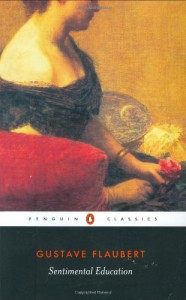Sentimental Education

“Sentimental Education” was the second novel I had to read for the Paris component of one of my university courses, and one I expected to like. I’ve wanted to read Flaubert’s “Madame Bovary” ever since I’ve heard about how irreplaceable it is in the world of literature, and “Sentimental Education” seemed like a great introduction into his writing.
The protagonist of “Sentimental Education” is the young Frederic Monreau who, like many other young French men his age, dreams of a possessing a standard set of things in life: a lavish life in Paris, a successful job, and a beautiful (and older) woman he could love. However, our Frederic is quite the indecisive young man whose decisions will at first frustrate you and often make you curse him under your breath, until at about the halfway point in the book when you realize you should actually be laughing at his ridiculous nature. That is how I felt, at least, with this book. Calling Frederic an arse would be an understatement, but he sure does make for a fascinating character study despite how easily he fleets among three – later on four – women, and his tactics of lying to get out of slippery situations even become admirable. But it took half a book to realize that and begin to finally appreciate it. This isn’t Flaubert’s fault but my own, perhaps due to a substantial dose of ignorance and lack of a full understanding on where Flaubert was coming from and where he was going with his novel.
For any reader of literature from around this time period, the issue with names is a familiar one, namely the sheer amount of characters that are present. Similarly, it took at least 150 pages to begin to associate names with what the character did, although after finishing I admit that Dussardier and Martinon were the two that still remained in a rather hazy corner of the mind. Because of this it was difficult to get into and enjoy the plot.
Once the story picked up however and these dilemmas were resolved I got into the general gist of things and quite enjoyed it. Flaubert is an undeniable talented writer with rich descriptions that are picturesque and sensorial, adding the proper touch of atmosphere to the novel. It was one of the best aspects, by far. Comparing it to the previous French novel we read in the course, Balzac’s “Old Man Goriot”, I will say that the former was more enjoyable yet was not as rich as “Sentimental Education” was in some ways. Both are quite successful with their ideas however, and to some extent I even enjoyed Flaubert’s treatment of the ending in his novel more than how Balzac approached his. Flaubert’s novel is more serious and loaded with details that give the reader a general understanding of the atmosphere and historical context of Paris over the time span of the novel. It’s worth reading the two together as they supplement each other – Flaubert’s is more serious and weighted while Balzac’s was like reading a thrilling drama that touched the heart. There were also more ideas there that were worth noting, unlike in “Sentimental Education”.
A novel worth reading for its main idea as well as to simply appreciate Flaubert’s writing, “Sentimental Education” has much to offer the patient reader, or one willing to put in the effort and occasionally fight their way through the writing in order to get to the juicier parts. For me, however, not as thrilling as I expected, but definitely something I’m glad to have read and experienced for myself after hearing much talk about it from others.





